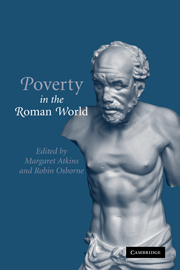Book contents
- Frontmatter
- Contents
- List of contributors
- Preface
- List of abbreviations
- Chapter 1 Introduction: Roman poverty in context
- Chapter 2 The poor in the city of Rome
- Chapter 3 Stratification, deprivation and quality of life
- Chapter 4 ‘You do him no service’: an exploration of pagan almsgiving
- Chapter 5 Writing poverty in Rome
- Chapter 6 Poverty and population in Roman Egypt
- Chapter 7 A pragmatic approach to poverty and riches: Ambrosiaster's quaestio 124
- Chapter 8 Portraying the poor: descriptions of poverty in Christian texts from the late Roman empire
- Chapter 9 Throwing parties for the poor: poverty and splendour in the late antique church
- Chapter 10 Salvian, the ideal Christian community and the fate of the poor in fifth-century Gaul
- Chapter 11 Poverty and Roman law
- Bibliography
- Index
Chapter 3 - Stratification, deprivation and quality of life
Published online by Cambridge University Press: 22 September 2009
- Frontmatter
- Contents
- List of contributors
- Preface
- List of abbreviations
- Chapter 1 Introduction: Roman poverty in context
- Chapter 2 The poor in the city of Rome
- Chapter 3 Stratification, deprivation and quality of life
- Chapter 4 ‘You do him no service’: an exploration of pagan almsgiving
- Chapter 5 Writing poverty in Rome
- Chapter 6 Poverty and population in Roman Egypt
- Chapter 7 A pragmatic approach to poverty and riches: Ambrosiaster's quaestio 124
- Chapter 8 Portraying the poor: descriptions of poverty in Christian texts from the late Roman empire
- Chapter 9 Throwing parties for the poor: poverty and splendour in the late antique church
- Chapter 10 Salvian, the ideal Christian community and the fate of the poor in fifth-century Gaul
- Chapter 11 Poverty and Roman law
- Bibliography
- Index
Summary
MEASURING ‘POVERTY’: TWO APPROACHES
Who is poor? There is a propensity to assimilate poverty to destitution. Other perspectives are possible. I would suggest that poverty assumes greater historical importance when the term is applied very loosely, in the sense of asking if societies as a whole were ‘impoverished’, and how this affected their development. There seem to me to be two ways of exploring this issue. One is by looking at the overall asset and income distribution in a society as a whole, in order to determine to what extent the concentration of resources at the top led to deprivation and impoverishment (however defined) of the general population. Alternatively, we may focus on the quality of life or human development as an indicator of overall well-being. This takes account of non-economic variables that are known to influence well-being, and in the absence of representative statistical data, such general factors (which include disparate features such as health, literacy, gender roles and legal rights) tend to be easier to study than a more narrowly defined phenomenon such as ‘poverty’. It also enables us to employ cross-cultural comparison both within the ancient world and between ancient and more recent societies, and to relate our research to the flourishing field of modern development studies. Both approaches ought to enhance the relevance of our findings to other disciplines.
- Type
- Chapter
- Information
- Poverty in the Roman World , pp. 40 - 59Publisher: Cambridge University PressPrint publication year: 2006
- 28
- Cited by



